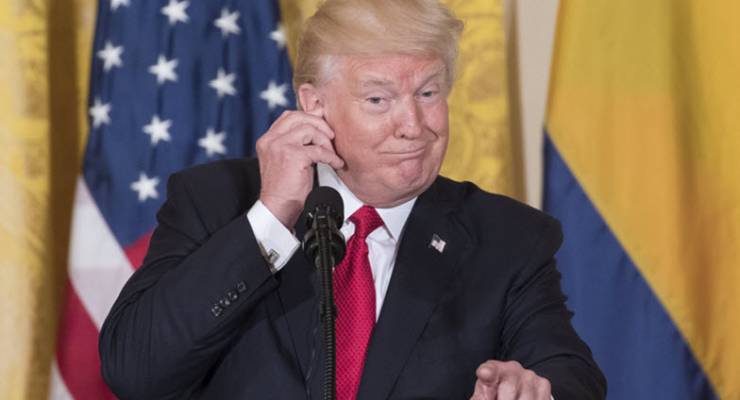
Donald Trump is finding that the Middle East is coming apart in his hands. The Trump cheer squad is so quiet about this, there is almost anti-noise. In the past two months, the US’ NATO allies Turkey have invaded northern Syria to crush the independent Kurdish city of Afrin, a centre of activity by the Syrian Kurdish People’s Protection Units (YPG).
The Turks say the YPG are just the Kurdistan Workers’ Party (PKK), fomenting terror inside Turkey. The YPG say they’re independent, and the Turks not only want to make Kurdish independence impossible, but also crush the self-managing “canton” system the Kurds have established. This includes their revolution in gender equality, which has women as 50% of the YPG’s forces, its commanders, and has dual mayors — male and female — for Kurdish towns, on both sides of the border.
To crush this, Turkey has simply repurposed some scattered Islamic State jihadis to attack the Kurds, along with Turkish regular troops. Russia has waved this through, despite Russo-Turkish rivalry, because the YPG had became so strongly aligned with the US (helping direct bombing campaigns from the ground, for example). The US has also waved through this takeover, which would have had the neocon hawks squawking about “American humiliation”, “Kurds like our founding fathers”, and so on, had Obama been overseeing it.
This episode of American powerlessness has been doubled down on, with the response to the Assad regime’s gas attack on Douma (yes, yes, I know there’s a small chance this is a mix of fabrication and exaggeration — but emphasis on “small”). Trump, having announced last week that the US would be out of Syria — at the same time as he was hiring neocon hawk John Bolton as his national security adviser — is now tweeting about “beautiful, smart” missile strikes. Having chastised Obama for revealing military intentions, Trump is now tweeting them out, like he was spruiking a new hotel. Either this is a further admission of limited power — another missile strike? Who gives a damn? — or a false lure, for something more serious, something which would devastate large areas of Damascus.
But, of course, the Russians have now stated that they will shoot down any missiles the US sends — which would be the first direct conflict between the Russians and the US (aside from some accidental skirmishes) since the beginning of the Cold War in 1945.
That is why some are calling it a confrontation on par with the Cuban missile crisis. The suggestion made by some that gas attacks have no distinct military value appears to be false — the terror and effectiveness of gas appears to have helped push rebel groups out of Douma. Obama’s “red line”, and Trump’s 2017 missile strike haven’t dissuaded the Assad regime from using gas. Given Russia’s presence, the US has limited scope for any escalation from missile strikes — and any such escalation might well become de facto, by losses, an act of war against Russia.
Trump’s creation of a vacuum of US action has prompted Israel to become more involved off its own bat — not out of any concern for gassed Syrian rebels and civilians, but because US withdrawal and powerlessness would embolden Iran, whose revolutionary guard forces are now far advanced into Syrian territory, hoping to ultimately link up with Hezbollah, and who have already had their emplacements bombed by Israel twice.
This is a deadly chess board that would test the most judicious of US presidents. It is far, far beyond the abilities of Donald Trump, and the de facto collegiate leadership that is running the White House. That has been disturbed by the entry of Bolton (the choice of whom appears to run against Trump’s strategic inclinations) who brings neocon ideology to what had been a more strategically prudent military triumvirate.
Enough to keep him busy during his seven-hour working day. But now he has also to contend with: the FBI/US attorney’s raid on his lawyer-consigliere Michael Cohen, which takes Mueller’s investigation to the heart of Trump-land; the announcement by speaker Paul Ryan that he will be retiring from politics, a sure sign that he believes both the House and possibly the Senate will be lost in November; and China’s cosmetic response to Trump’s tariff war, beaten up over here as “Trump’s triumph”.
Some war, some triumph. We are in that eerie interregnum: a globally dangerous situation, which we can do nothing about, and do not even feel in our bones. Yet.








Crikey is committed to hosting lively discussions. Help us keep the conversation useful, interesting and welcoming. We aim to publish comments quickly in the interest of promoting robust conversation, but we’re a small team and we deploy filters to protect against legal risk. Occasionally your comment may be held up while we review, but we’re working as fast as we can to keep the conversation rolling.
The Crikey comment section is members-only content. Please subscribe to leave a comment.
The Crikey comment section is members-only content. Please login to leave a comment.